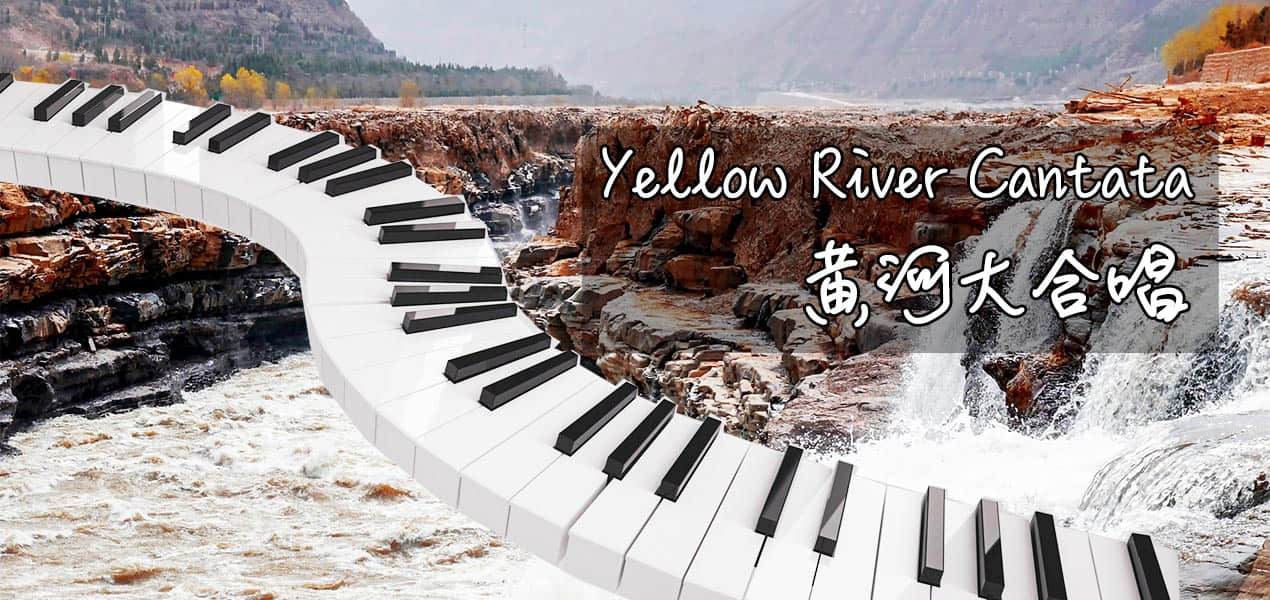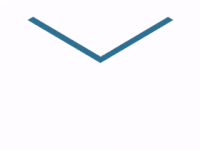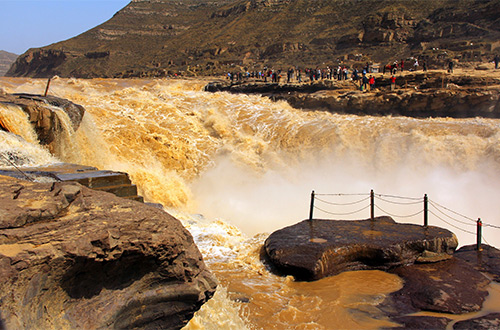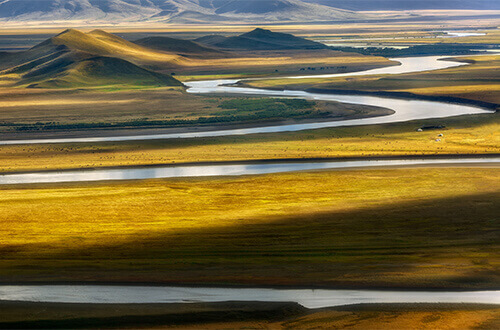Songs About the Yellow River

The Yellow River valley was the birthplace of Chinese civilization and has given the Chinese people both precious material and spiritual wealth. The Yellow River has nurtured China with its abundant resources and, as such, is also known as the "Cradle of Chinese civilization”. It has inspired numerous poems, and many songs were also inspired by the river. Just like the Czech composer Bedoich Smetana used the famous river Vltava in his symphonic poem, Ma Vlast, we have the Yellow River Cantata in China. The cantata illustrates the Chinese people's indomitability and ability to deal with hardships during the Sino-Japanese War. We also have other Yellow River songs that reflect our love for the country and hope for a better life.
1. Yellow River Cantata 黄河大合唱 huáng hé dà hé chàng
The "Yellow River Cantata" was produced in 1939, the most difficult time of the Sino-Japanese War. The Cantata was composed by famous composer Xian Xinghai, and the lyrics by Guang Weiran (pen name for Zhang Guangnian).
The Yellow River Cantata was born out of a patriotic poem, ‘Yellow River’, written by Guang Weiran. In November 1938, while crossing the Yellow River near the Hukou Waterfall, with combatants from the Chinese Communist Party, he chanced upon boatmen singing spirit-uplifting songs, while battling against heavy gales and torrential waves. Inspired by this encounter, he composed the poem in January 1939 and performed it during the Chinese New Year celebrations. When Xian Xinghai first read the poem; he grasped the paper in his fists and exclaimed in excitement that he would put it into music properly. Xian composed the music in just six days; the first performance of Yellow River Cantata in Yan’an was an unprecedented success. Mao Zedong was in attendance at the 2nd performance. The work soon spread to all parts of China and helped to boost both civilian and military morale during the war against Japan. The orchestra included a melange of western and Chinese instruments—violin, harmonica, guitar, erhu (Chinese bow-stringed instrument), sanxian (a Chinese three-stringed plucked instrument), gong and bamboo flute—along with bells, cymbals, and woodblocks.
The eight movements of the cantata are:
-
No.1 Song of the Yellow Boatmen 《黄河船夫曲》
-
No.2 Ode to the Yellow River 《黄河颂》
-
No.3 The water in the Yellow River comes from heaven 《黄河之水天上来》
-
No.4 Ballad of the Yellow Waters 《黄水谣》
-
No.5 Dialogue song by the Yellow River 《河边对口曲》
-
No.6 Lament to the Yellow River 《黄河怨》
-
No.7 Defending the Yellow River 《保卫黄河》
-
No.8 Shout Aloud, Yellow River! 《怒吼吧,黄河》
2. We Are the Yellow River, We Are the Mount Tai 我们是黄河泰山 wǒ men shì huáng hé tài shān
Since the Economic Reform in China in 1979, the Chinese economy is booming, and people’s lives are much better. Before the reform, more than 88 per cent of China's population lived on less than $US2 a day. Inspired by the optimistic mood of the society, Songwriter Cao Yong wrote this song in 1986.
Mount Tai in eastern China's Shandong Province is the most sacred place in Chinese culture. In history, it was believed that Mount Tai could connect heaven and hell, deities and ghosts. Many great emperors had held Feng Shan, the most sacred and honorable worship ceremony in ancient Chinese culture, on Mount Tai. Peng Liyuan (now the first lady of China ) sang, "We Are the Yellow River, We Are the Mount Tai" during the 1988 Spring Festival Gala. Here is an excerpt of the lyrics:
wǒ màn bù huáng hé àn biān ,zhuó làng tāo tiān xiàng wǒ hū huàn
我漫步黄河岸边,浊浪滔天向我呼唤
I stroll at the bank of the Yellow River, the overflowing waves shout to me
zǔ xiān de lì shǐ xiàng huáng hé wàn gǔ bēn liú
祖先的历史像黄河万古奔流
The history of our ancestors is just like the Yellow River, keeping flowing continually for thousands of years
zǎi zhe duō shǎo xīn suān duō shǎo fèn nù
载着多少辛酸 多少愤怒 With so much bitterness and anger in it
duō shǎo kǔ nán
多少苦难 And so many miseries in it
tài shān xiàng wǒ hū huàn, yào zuò zhōng huá hǎo hàn
泰山向我呼唤,要做中华好汉 Mount Tai is calling , Be true heroes of China
wǒ miàn duì dà hǎi zhǎng tiān, yòng gē shēng xiàng wèi lái hū huàn
我面对大海长天, 用歌声向未来呼唤 Facing sea and sky, I sing a song to the future
zhōng huá de xī wàng xiàng tài yáng yī dìng huì shēng qǐ
中华的希望像太阳一定会升起 China will rise like the sun.
wǒ men bú fù zǔ xiān jì wǎng kāi lái
我们不负祖先 继往开来 We’ll follow the path of our ancestors and open up the future
3. Huang He Chang Jiang (The Yellow River, The Yangtze River) 黄河长江 huáng hé cháng jiāng
This was a posthumous work of Zhang Yu-sheng (1966-1997). Chang was a Taiwanese pop vocalist, songwriter and record producer. He died in a car accident in 1997. Singer Yang Pei An is a big fan of Zhang, he wanted to retrieve all the songs from the posthumous works of Zhang. With help from composer Koji Sakurai and audio mixer Killer Wang, Yang finally retrieved several songs successfully. In this song, Zhang shows deep love for China. The Yellow River and the Yangtze River are the two most important rivers in China. The Yellow River is the cradle of Chinese civilization while the Yangtze River is the powerhouse for the Chinese economy. Here is an excerpt of the lyrics:
wǒ shì zhōng guó de mǔ qīn , wǒ yùn yù zhōng guó de ròu tǐ
我 是 中 国 的 母 亲 , 我 孕 育 中 国 的 肉 体 I'm mother of China, I gave birth to the Chinese Civilization
qiān xì qiān bǎi nián de hū xī, wǒ shì zhōng guó de shēng mìng
牵 系 千 百 年 的 呼 吸 , 我 是 中 国 的 生 命 With thousands of years of cries, I am the life of China
wǒ shì zhōng guó de xuè yè, tíng bú zhù xiōng yǒng de yùn háng
我是中国的血液 ,停不住汹涌的运行 I’m blood of China, keep flowing without stop
bàn suí zhe qiān bǎi nián de nà hǎn, wǒ shì zhōng guó de shēng mìng
伴随着千百年的呐喊 ,我是中国的生命 With thousands of years of cries, I am the life of China

 Yellow River Facts
Yellow River Facts  Highlights Along the Yellow River
Highlights Along the Yellow River  Poems About Yellow River
Poems About Yellow River  Chinese New Year Songs
Chinese New Year Songs